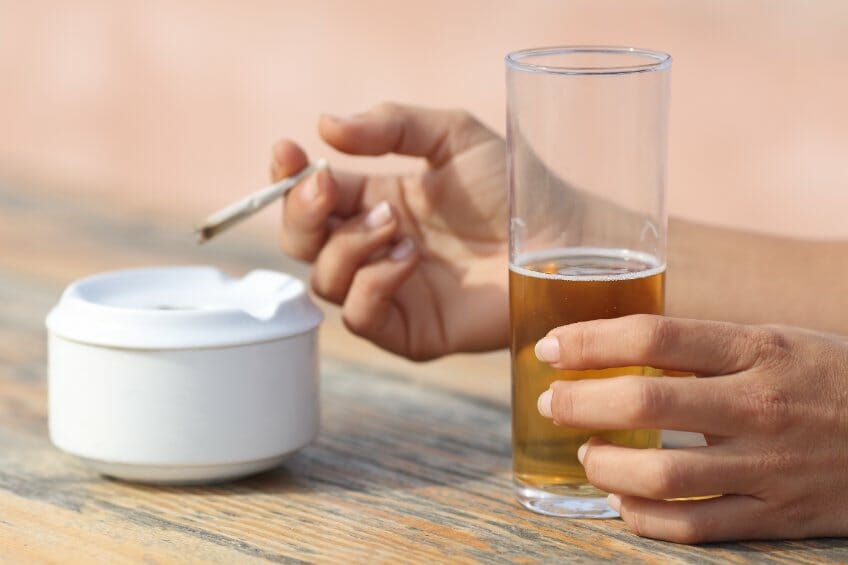Whether it’s raising a glass of bubbly to toast a special occasion or unwinding with a beer at the end of the day, a majority of American adults regularly consume alcohol, according to the National Institute of Alcohol Abuse and Alcoholism. But some Arizonans are reassessing their alcohol use and turning to cannabis. So which is better in the alcohol vs. cannabis debate?
It’s been nearly two years since Arizonans voted to legalize adult-use cannabis, allowing those over the age of 21 to purchase, use and cultivate cannabis without a medical marijuana card. In 2021, the Arizona Department of Revenue reported that total medical and adult-use cannabis sales in the states hit $1.23 billion dollars.
“We’ve seen an increase in customers looking to cannabis for help managing stress, improving sleep, or simply celebrating without the empty calories or sluggish mornings often associated with alcohol,” said Lilach Mazor Power, founder and CEO of Giving Tree Dispensary in north Phoenix. “They understand that the stigma around cannabis is just that – a stigma.”
READ ALSO: Here’s why Arizona cannabis sales are expected to blossom
READ ALSO: Lilach Mazor Power becomes a leader in male-dominated cannabis industry
That stigma didn’t always exist. Evidence of cannabis use dates back thousands of years to ancient China. It was a staple crop in the American colonies and was even grown for fabric at President George Washington’s Mount Vernon. Throughout the late 1800s and early 1900s, cannabis was sold as a medicine and prescribed by doctors for pain relief.
It was only with the influx of Mexican immigrants following the Mexican revolution in the 1910s that public sentiment in America shifted. Their use of cannabis, referred to as marijuana, for its psychoactive properties lead to increasingly strict regulation. Cannabis consumption was maligned as a means of disparaging these unwelcome immigrants, until it was ostensibly banned with the Marihuana Tax Act of 1937.
It wasn’t until 1996 that California legalized medical cannabis. Today, 39 states allow some form of legal cannabis sales.
Alcohol vs. cannabis
Despite that, some consumers are still concerned about the stigma of using cannabis.
“It’s troubling that happy hours and ‘mommy wine culture’ are socially acceptable, but consuming a plant is still seen by many as a taboo,” Power observed. “It’s not just about getting ‘high’ for a lot of people. It’s about taking the edge off after a tough day with something that isn’t going to give them a headache, or treating physical discomfort without over-the-counter pain relievers.”
Consumers have many choices when shopping for cannabis at licensed Arizona dispensaries, which offer a wide range of doses, prices, and consumption methods.
Power advises those interested in exploring cannabis adhere to the mantra “start low, go slow” – meaning start with lower doses and allow your body time to adapt and react. She recommends visiting a dispensary and sharing your goals with a staff member.
“Just as people metabolize beer, wine, and liquor differently, everyone’s cannabis journey is unique. I always recommend people take their time and trust the professionals at licensed dispensaries,” Power shared.
Phoenix advertising executive Sandra Guadarrama-Baumunk decided to try cannabis for her perimenopause symptoms. “I tried all the OTC products, and it really was just a temporary band-aid,” said Guadarrama-Baumunk. She was referred to a cannabis capsule product for perimenopause called Revelry. “I have zero hot flashes and I’m a lot less irritable.”
A growing body of research shows certain substances in cannabis, known as cannabinoids, help various health conditions. Last year, the Food and Drug Administration approved prescription medications that use specific cannabinoids to treat seizures and nausea resulting from chemotherapy.
Cannabis has gone mainstream with the rise of a cannabinoid called cannabidiol, or CBD. This common substance in cannabis plants has risen in popularity in recent years and can be found in everything from body lotions to beverages. But not all cannabis products are created equal.
Consumers should be aware that products sold in licensed Arizona dispensaries must adhere to strict testing and reporting requirements as outlined by the Arizona Department of Health. The CBD sold at a mall kiosk or gas station doesn’t have to meet the same production and testing requirements as those sold at licensed dispensaries.
Power, who also serves as board vice president of the Arizona Dispensaries Association, hopes that with more people will reconsider antiquated stigmas around cannabis. “This plant is so versatile and complex. It’s exciting to see consumers explore its potential.”
Author: Stef Swiergol is director of marketing at Mazor Collective and co-founder of Revelry Cannabis. Mazor Collective is one of only a few women majority-owned Arizona cannabis company. The collective includes vertically integrated, Arizona-based Giving Tree Dispensary as well as product lines Kindred, Sneakers and cannabis for menopause brand, Revelry. For more information visit www.mazorcollective.com/




